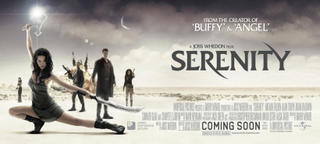
There’s a good chance I’ll be attending a preview screening of Serenity this Wednesday (whoops: Tuesday the 27th, not Wednesday). So far I have avoided all spoiler links and stories, and I will attempt to post a spoiler-free review shortly after the movie.
Page 75 of 81
Vernor Vinge’s forthcoming novel, Rainbows End, is due out by Tor Books in May, 2006. IEEE Spectrum excerpted a sample of the novel, Synthetic Serendipity, online a year ago. Now’s as good a time as any to re-read this chapter.
Yesterday I added comments and permalinks via Blogger’s dashboard, following instructions to the dot. It appears this action killed the time stamp on the posts, something I noticed only today. Not critical, I suppose, just irritating.
Updated: Time stamps have been fixed while retaining permalinks, I think. Also noticed a trio of comment-spam in the most recent post. It’s like the squids in The Matrix; spammers pervade the entire system and eventually you’re simply tracked down, with no EMP devide at hand to save you.
Via Roderick Long’s blog, news that Isabel Paterson’s novel, Never Ask the End has been republished. According to Long, this novel is not political, yet Paterson is lauded as a good novelist.
I received this tome by Ray Kurzweil in the mail recently. Can’t say much since I just started reading it, but as a non-fiction science book it looks both exciting and intimidating. Some other recent books of similar interest include: Ramez Naam’s More Than Human : Embracing the Promise of Biological Enhancement, Ron Bailey’s Liberation Biology, Gregory Stock’s Redesigning Humans: Our Inevitable Genetic Future, and Joel Garreau’s Radical Evolution : The Promise and Peril of Enhancing Our Minds, Our Bodies—and What It Means to Be Human. I have a copy of Bailey’s book, which is next on the reading list, and of the others Garreau’s looks compelling. 
Enjoyed this lovely quote from Wired magazine about a private company that wants to open a human settlement on Mars:
“Why should people live on Mars? And if it’s going to be done, should a private enterprise engage in what would be one of humanity’s defining moments?”
The article brings up the old UN bombast about space existing for all humanity. Makes me think if the UN had been around a few thousand years ago we’d have this scenario: exploration and use of the oceans shall be carried out for the benefit and in the interest of all countries. End result? Everyone remains in place except for a few connected bureaucrats. We need off this planet, if only to ensure humankind’s survival. The threshold for the technology of mass murder quickly falls year by year. Sows the seeds of humanity outward, and at least some people may escape. Only private enterprise will make it happen other than as a TV moment.
Perhaps the members of Congress should study the Constitution more before madating a Constitution Day. If three-fourths of surveyed students think it’s okay to censor the internet, no doubt the number in Congress is nine-tenth. The same can be said for the Supreme Court, which gutted the Fifth and Ninth Amendments with Kelo. Hey, throw in the Executive Branch, which summoned forth the Category Five State in the wave of Katrina. Yeah, I’m bitter.
Claire Wolfe lists 35 movies in several categories with vote by readers to determine the best libertarian movies. I question some of the choices and omissions–I mean, Minority Report stank–but others are most definitely classics. The most difficult choice for me fell in the Animated category, where three of the movies are in a dead tie. Jon Osborne used to have a great site on movies and liberty, but the last update he posted is dated over a year ago.
Wally Conger emailed to let me know he had purchased a copy today, so my reports a couple of days ago about the delay apparently were incorrect. I picked up all three versions of the new issue, and may post a complete review soon.
L. Neil Smith’s novel (Del Rey, 1984) is available again for sale as an e-book (PDF format) for five bucks. There’s a brief note about this over at The Libertarian Enterprise, an electronic non-fiction newspaper published by Smith since 1995. Artist Scott Bieser’s cover for Tom Paine Maru is, well, interesting. Margaret Atwood might nod her head upon seeing this cover, as if to confirm her own views of science fiction. Bieser, who also did the art for the the graphic novel version of The Probability Broach, recently launched a blog.